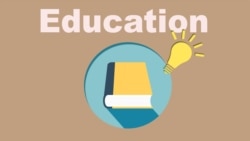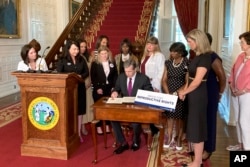Nina Huang is a California high school student who is thinking about where she wants to go for college. Until recently, she was considering Oberlin College in the state of Ohio. Huang, who plays flute and piano, hopes to one day also study medicine or law. Oberlin is known for having strong academic and music programs.
But last month, she changed her mind.
“I don’t want to go to school in a state where there is an abortion ban,” she said.
Ohio is one of the states that now has strong restrictions on abortion, a medical procedure that ends a pregnancy.
On June 24, the U.S. Supreme Court ruled to overturn the 1973 Roe v. Wade case that protected abortion rights throughout the United States. The court’s decision permits individual states to go back to old rules or put new restrictions on abortion in place.
Huang had been thinking Oberlin’s good academic reputation and strong music classes might make it a good fit for her. But not anymore.
Huang is not the only high school student re-thinking their college choices.
Samira Murad is a high school student in New York City. She said she is worried about going to college in a state where she will not be free to be herself. She said, “I’m still finding out who I am … I don’t want to move somewhere I can’t be myself because of laws put in place.”
‘Dream school’ no more
It is still too soon for data to show whether fewer people are applying to college in Ohio and other states that now have strict laws on abortion. But some college counselors say they are already talking with students who are crossing their “dream school” off their lists.
Daniel Santos runs the Florida-based college counseling service Prepory. “Some of our students,” he said, “will not apply to colleges and universities in states which may infringe on their access to reproductive rights.”
Kristin Willmott works with students at a company called Top Tier Admissions in Massachusetts. She said some students are removing schools in Florida and Texas from their application lists because of abortion restrictions. Florida and Texas are among the states with strong anti-abortion laws.
Past controversies did not reduce applications
Although there is no data yet on how the Supreme Court decision may affect application numbers, there are past examples to consider.
Jayson Weingarten works for Ivy Coach in New York. He helps students think about colleges. He said that, in 2016, some students told him they no longer wanted to apply to top colleges in North Carolina after the state put a controversial law in place that year. The law restricted which bathrooms transgender people could use.
But many still chose to attend both Duke University and the University of North Carolina, Chapel Hill (UNC). In fact, the number of students who applied to UNC in 2017 went up by 14 percent compared to the year before.
The state of Texas put a restrictive abortion law in place nearly one year ago. Shahreen Abedin is a spokesperson for the University of Texas' medical school. Abedin said that the school has not seen a drop in applications since the law went into effect on September 1, 2021.
New plans, new questions
Alexis Prisco is one student who is rethinking her plans. Prisco is a 17-year-old high school student from Maryland. She wanted to apply to Washington University, a top school in St. Louis, Missouri. Both of her parents went there. But now that Missouri is a state with strong abortion restrictions, she is worried.
She said her mother warned her about applying to colleges in states that had strong anti-abortion laws set to take effect after the Supreme Court decision.
Washington University did not answer questions sent by the Reuters news agency for this story. Oberlin also did not provide a comment.
Washington University pointed reporters to a recent story on the school’s website reacting to the decision. The university leader and the leader of the school of medicine wrote: “This is a painful moment for many in our society.” The university leaders said they understand many people are feeling “frustrated, disappointed and even scared of what this decision may mean.”
Sabrina Thaler is a student in Maryland. The 16-year-old said she has been thinking about an important abortion-related question since May, when an early version of the Supreme Court’s decision was leaked. She said she asked this question in a recent class discussion: "What if I go to a college in a state where abortion is banned and I get raped and then I don’t have the option to have an abortion?"
I’m Dan Friedell.
Dan Friedell adapted this story for Learning English based on a story by Reuters.
_______________________________________________________________________
Words in This Story
apply– v. to ask for something, such as a job or a place at a school
abortion –n. a medical procedure used to end a pregnancy
reputation –n. a common opinion people have about something
academic – adj. relating to schools and education
infringe – v. to limit or restrict something, such as a person’s rights
controversial – adj. something that causes great discussion or argument
transgender –n. relating to people who feel that their true nature is as a member of the opposite sex
society –n. people in general who are living in organized communities
frustrated –adj. angry or upset or discouraged because of being unable to do something
disappointed –adj. feeling sad, unhappy, or displeased because something was not as good as expected or because something you hoped for or expected did not happen
option –n. a choice between two or more things or the ability to choose something
___________________________________________________________________
What do you think of this story? We want to hear from you.
We have a new comment system. Here is how it works:
Write your comment in the box.
Under the box, you can see four images for social media accounts. They are for Disqus, Facebook, Twitter and Google.
Click on one image and a box appears. Enter the login for your social media account. Or you may create one on the Disqus system. It is the blue circle with “D” on it. It is free.
Each time you return to comment on the Learning English site, you can use your account and see your comments and replies to them. Our comment policy is here.















Forum